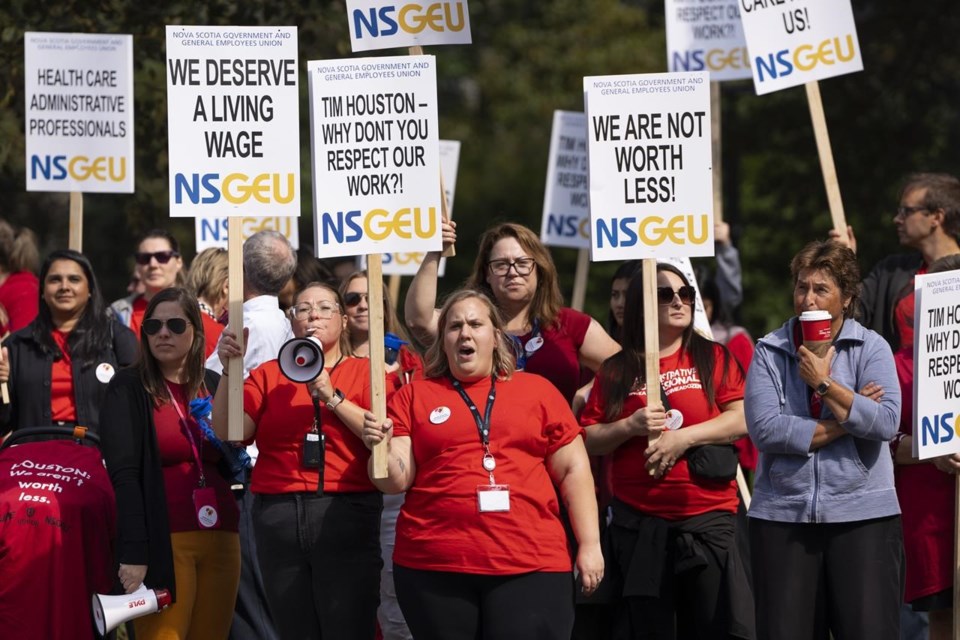HALIFAX — Dozens of unionized hospital administrative staff swapped their keyboards for placards Monday as they rallied for higher pay outside of a Halifax hospital.
Dressed in red, many blew whistles and held signs that read: “We deserve a living wage," "Health care needs us” and “Tim Houston — why don’t you respect our work?”
The scene was repeated at 10 other hospitals across the province by clerical workers who do such things as patient appointment scheduling and health record data entry.
More than 5,000 workers represented by three unions have been without a new contract since Oct. 31, 2020. In June, they overwhelmingly rejected a tentative deal negotiated with the provincial government led by Premier Tim Houston.
Sandra Mullen, president of the Nova Scotia Government and General Employees Union (NSGEU), which represents 3,800 workers, said they want a wage increase that keeps up with inflation. Mullen said some workers are currently making as little as $18 an hour.
“You put two and three per cent on $18 an hour, that’s not a big adjustment when inflation has been through the roof,” she said. Mullen said contract negotiations are set to resume Oct. 11.
Meanwhile, Mullen said talks were continuing with the provincial health authority on establishing an essential services plan for a potential strike. Under provincial legislation, certain workers in the health-care sector have to be designated as essential before their union can call for work stoppages involving those not deemed essential.
Giselle Clarke, a secretary at the Mumford Health Centre in Halifax, noted a contradiction in the province’s stance.
“On one hand yes, they recognize that we are essential but they don’t want to pay, so it’s interesting the predicament that we are in,” Clarke said.
Other workers in Nova Scotia’s health-care system have seen substantial increases as the government tries to attract and retain professionals such as doctors and nurses.
In June, 10,000 nurses voted to accept a five-year deal that gave nurse practitioners a 21-per-cent increase in pay by the end of the contract, while registered nurses saw raises ranging from 15 to 21 per cent. Licensed practical nurses saw jumps of 12 to 17 per cent.
The province’s doctors also signed a new four-year agreement in June that would see them get a 10-per-cent salary increase over the life of their contract.
Natasha Beals, an NSGEU local vice-president at the Victoria General Hospital in Halifax, said she wants the public to know that workers such as herself are the “backbone” of the system.
“If it wasn’t for us, patients wouldn’t have appointments, they wouldn’t have their blood work done and they wouldn’t be able to get cancer care treatments, Beals said.Â
She added that a number of clerical staff who work with the health authority also hold down part-time and casual jobs to make ends meet.
“I’m terrified to go on strike, because that means I wouldn’t be able to pay my rent or feed my child unless I ask for help,” Beals said.
Allan MacMaster, the minister responsible for labour relations, has denied that the government is dragging its feet with workers who are at the lower end of the health-care pay scale. “We need people to want to work in the jobs they are in — if we lose them, then that creates problems for us, too,” he said following cabinet on Thursday.
This report by The Canadian Press was first published Sept. 25, 2023.
Keith Doucette, The Canadian Press




